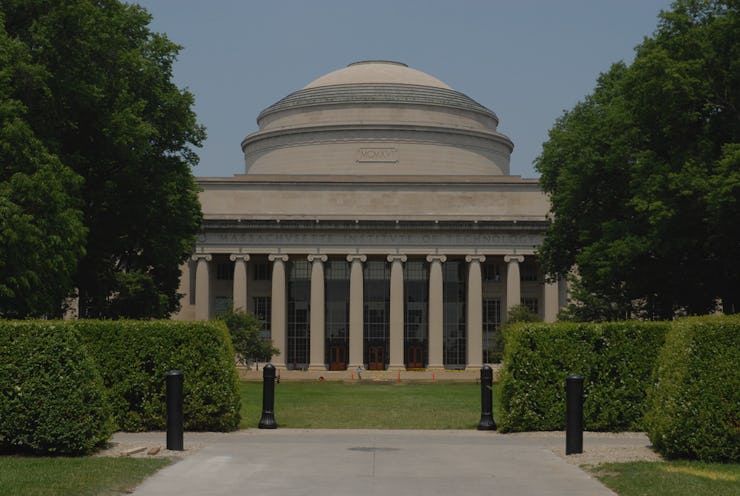Writing About New Media at M.I.T.: This Week's Saturday Syllabi
Take a class without having to go to school.

Saturday Syllabi is here to bring you college courses from around the world so that you can keep getting smarter long after you’ve dropped out to help with the family farm.
We’ve previously highlighted authors-turned-teachers, and while we love Junot Diaz, Zadie Smith, and David Foster Wallace, we figured it was high time to let the career academics take over.
This week we’re getting nerdy, but, you know, entertainingly nerdy, with an awesome science class from M.I.T.
Class: Science Writing and New Media
Professors: David Custer and Elizabeth A. Page
Course Description: “This subject is designed to improve communication ability and communication habits. Additional improvement is expected in students’ attitude towards writing and oral presentations; as the semester progresses, students should feel confident of their ability to write, present, and work in teams. Satisfactory performance in 21W.732 indicates a mastery of communication skills sufficient for success at communication tasks required in M.I.T. classes.
This course introduces writing, graphics, meetings, oral presentation, collaboration, and design as tools for product development. The communication instruction is embedded in design projects that require students to work in teams to conceive, design, prototype and evaluate energy related products. The communication instruction focuses on the communication tasks that are integral to this design process, ranging, across design notebooks, email communications, informal oral presentations, meeting etiquette, literature searches, white papers reports, and formal presentations. In addition to the assignments specific to product development, a few assignments, especially reading and reflection, will address the cultural situation of engineers and engineering in the world at large.
Expect to devote six hours of “scheduled” time per week (including both writing and design) to 21W.732; four of these hours will be class time, and two of these hours will be “non- class” time that can be used for team meetings, conferences, and project work.
There is NO final exam in 21W.732.”
Prerequisites: “This course has no prerequisites and is open to all M.I.T. students. The subject is normally required for majors in science writing.”
Experimental Study Group: This section of the course was taught as part of M.I.T.’s Experimental Study Group (ESG). In contrast to the set structure of the regular curriculum, ESG’s flexibility allows students to go at their own pace whenever possible and to organize their schedules to suit their needs. ESG’s small classes allow students to interact more often with faculty and fellow students than is typical in larger classes, and to experiment with novel ways of learning the material.”
Reading List:
- Graham, M., A. Slocum, and R. Moreno Sanchez. “Teaching High School Students and College Freshmen Product Development by Deterministic Design with PREP.” Journal of Mechanical Design 129 (July 2007): 677.
- Oakley, Barbara, et al. “Turning Student Groups into Effective Teams.” Journal of Student Centered Learning 2, no. 1 (2004): 9.
- Philips, Patricia L. “So You’re Going to be a Member of a Team.” Chemical Engineering Progress, January 1997.
- “Theory of Multiple Intelligences.” Wikipedia.
- “Tuckman’s Stages of Group Development.” Wikipedia.
- Gopen, George, and Judith Swan. “The Science of Scientific Writing.” American Scientist.
- Kishlansky, Mark A. “How to Read a Document.” Sources of World History Volume 1. Wadsworth Publishing, 2006. ISBN: 9780495091516.
- ASME. “ASME Code of Ethics for Engineers.”
- Yates, JoAnne. “Active Listening and Reflective Responses.” M.I.T. Sloan Communication Program Teaching Note. (Courtesy of JoAnne Yates. Used with permission.)
- Pogue, David. “A Camera That Has It All? Well, Almost.” New York Times, December 8, 2005.
- Williams, Jim. “Should Ohm’s Law Be Repealed?” Analog Circuit Design. Butterworth-Heinemann, 1991. ISBN: 978075069640.
- Florman, Samuel C. The Existential Pleasures of Engineering. St Martin’s Griffin, 1996. ISBN: 9780312141042.
- Petroski, Henry. Invention by Design: How Engineers Get From Thoughts to Thing. Harvard University Press, 1996. ISBN: 978067446384.
- Jan, Tracy. “At MIT, Chic Nudges Geek: Some Want Their School to Shed Notorious Nerd Image.” The Boston Globe, October 15, 2008.
- Nugent, Benjamin. “The Way We Live Now: 7-29-07: Idea Lab; Who’s a Nerd, Anyway?” The New York Times, July 29, 2007
- Thurber, James. Fables for Our Time and Famous Poems Illustrated. Harper Perennial, 1983. ISBN: 978006090994.
- Bolles, Richard N. What Color is Your Parachute? 2011: A Practical Manual for Job-Hunters and Career-Changers. Ten Speed Press, 2010. ISBN: 9781580089890.
- Pound, Ezra. “In a Station of the Metro.”
This class basically does what the course title says and brings the science and new media down hard. There’s no prerequisites, so anybody is fair game, and it seems to be one of those strangely broad yet distilled courses that you’ll remember and remark upon after you graduate. And the best part is THERE’S NO FINAL EXAM.
But seriously, classes that give students the freedom of not worrying their asses off when exam week rolls around are usually classes for the ages that let students breathe a bit and really find their way around the subject matter. This awesomeness is especially true when you scope out the reading list, which is comprised of mostly PDFs and a few actual books, but also has Wikipedia pages and, whut, a two-line poem by Ezra Pound.